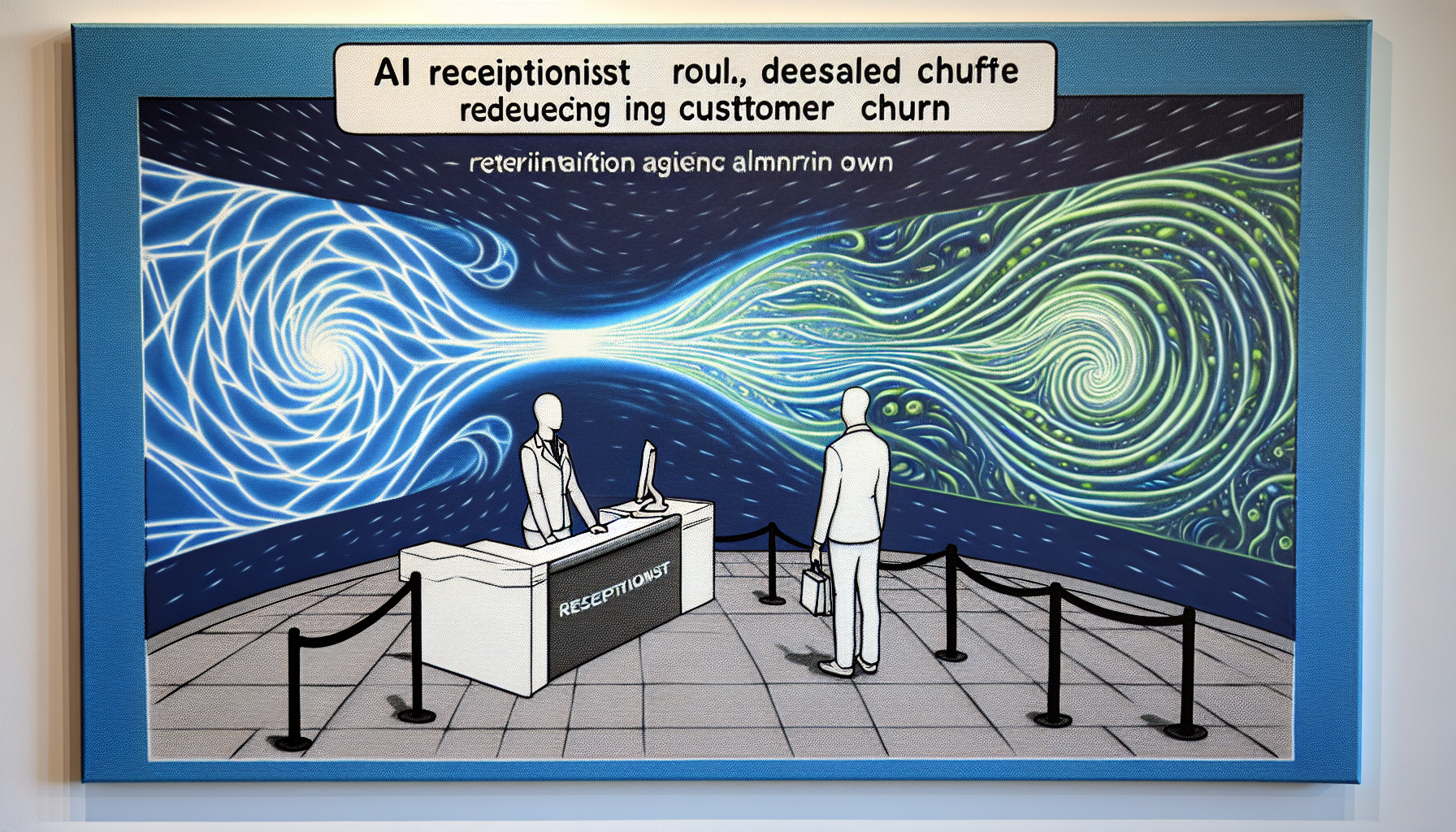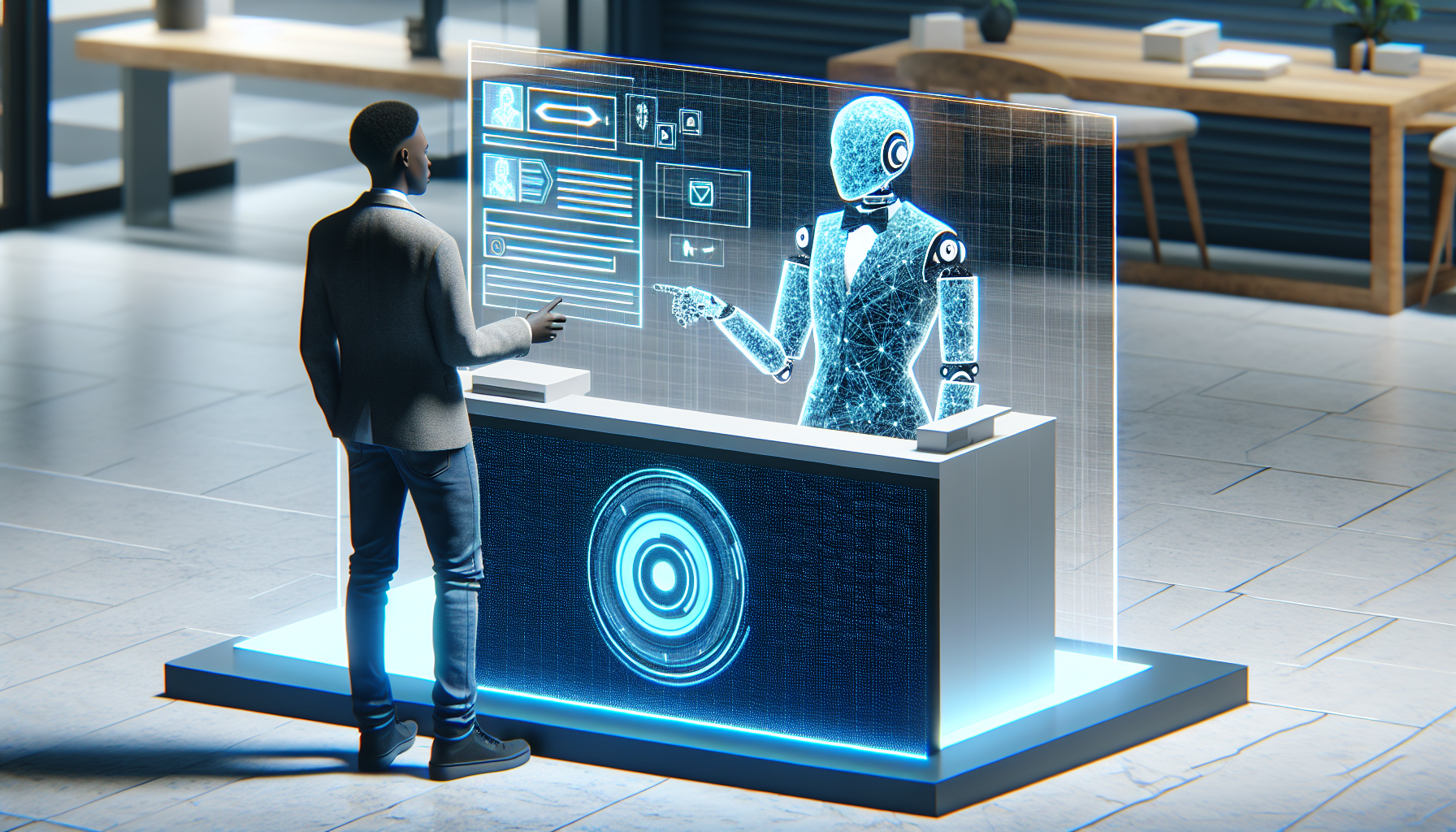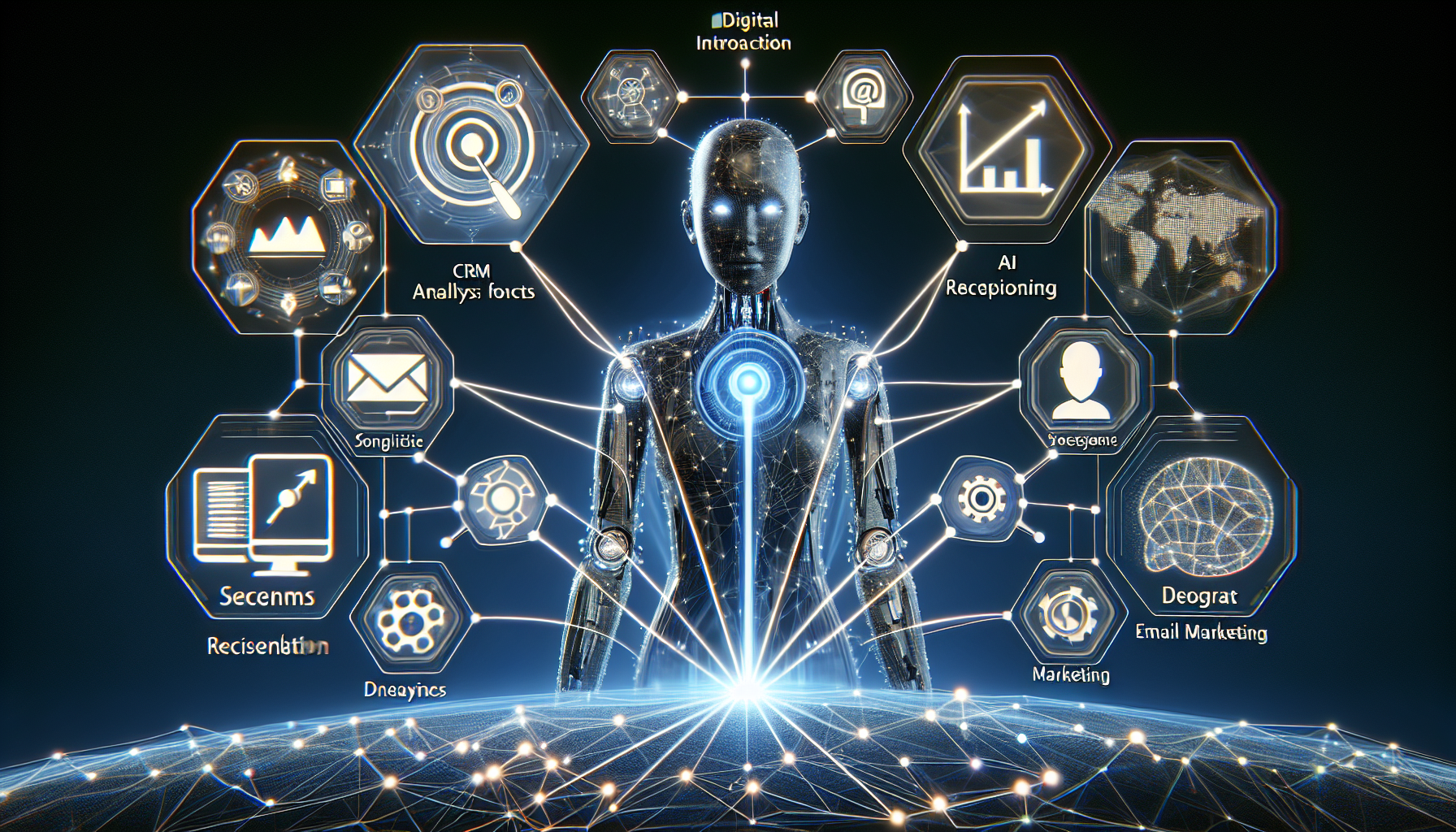
In the diverse stratum of business ecosystems, standing out as an exceptional customer-centric enterprise may seem daunting. At the core of creating vibrant business value lies the potential of High-Quality Customer Service. Today, the paradigm shift towards technological adoption presents an innovative solution to enhance the customer experience: the introduction of the Artificial Intelligence (AI) Receptionist.

Found at the juncture of machine learning, natural language processing, and cutting-edge design, AI Receptionists symbolize the epitome of futuristic, smart, and efficient customer interaction. Their functionality revolves around Artificial Intelligence and its potential to mimic human-like interaction. These digital touchpoints aid businesses by handling queries, booking appointments, empathizing and solving customer problems around the clock. This leaves more complex issues to be handled by human staff, ensuring a streamlined and productive business operation.
The broader benefits of AI Receptionists encompass a variety of business areas. Cutting edge customer service using these smart assistants can elevate a business's public image and brand value, leading to improved customer loyalty and reduced churn rates. AI Receptionists can efficiently handle vast volumes of interactions, reducing hold times and enhancing customer satisfaction. Built to learn continuously, these AI-powered receptionists can augment their problem-solving abilities and offer personalized responses over time.
In conclusion, AI Receptionists represent a significant investment for businesses striving to enhance customer satisfaction levels, streamline operations, and reduce customer churn. In a world where customer-facing roles are undergoing rapid digital transformation, these AI-centric solutions are not just an add-on; rather, they have emerged as the cornerstone of modern business communication strategies.
In today's digital age, businesses are constantly seeking innovative ways to improve customer engagement, streamline operations, and diminish customer attrition rates. One solution to this is the adoption of AI receptionists, a technological advancement that has shown remarkable potential in refining the customer experience and consequently, reducing customer churn.
AI receptionists serve as a first line of interaction with customers, providing instantaneous and round-the-clock service. Unlike their human counterparts who may be restricted by standard business hours or logistical constraints, AI receptionists are constantly available, dramatically boosting accessibility, and making it easier for customers to voice out their concerns and queries. This allows businesses to provide seamless service to customers in different time zones and avoid the potential dissatisfaction arising from delayed responses.
The rapid adoption of AI technology continues to transform the way we deliver customer service. AI receptionists enhance response times by responding to customer inquiries almost instantly, which significantly reduces wait times and increases customer satisfaction. They utilize machine learning algorithms to handle routine tasks and frequently asked questions, freeing up human agents to handle more complex issues that need specialized attention. This efficiency in both speed and precision work in tandem to reduce the chances of customers disconnecting due to prolonged waiting times or unresolved issues.
In conclusion, businesses aspiring to provide an optimized customer experience and reduce churn rates should strongly consider employing AI receptionists. They not only enrich customer engagement but also bring forth a myriad of benefits ranging from enhancing accessibility, improving response times, to overall operational efficiency. AI receptionists are indeed redefining the future of customer service and helping businesses forge stronger and more lasting relationships with their customers.
In the evolving field of customer service, AI Receptionists have come to the fore as potent tools in driving customer satisfaction and engagement. Notably, the AI-enabled receptionists have been fundamental in reducing customer churn rates. Leveraging a digital approach and automated functionalities, these AI-based systems have bolstered one-on-one customer engagement, while ensuring timely and efficient resolutions to customer queries.

Multiple case studies and insights drawn from real-world applications have substantiated the correlation between AI receptionists' usage and corresponding improvements in customer satisfaction. In an extensive study from IBM, implementing an AI receptionist led to a 20% reduction in call volume, 40% decrease in email volume and a subsequent surge in customer satisfaction rates. The AI intervention not only eased the burden on human agents, but also streamlined customer interactions—proving instrumental in customer retention.
In another compelling Gartner case study, DB Schenker, a leading logistics company, incorporated an AI receptionist that personalized customer interactions and instantaneously resolved simple queries. The result—a 30% decrease in customer complaints, indicating a significant cut down on customer churn rates.
Furthermore, research from Accenture indicated that 57% of companies that implemented AI-powered receptionists reported higher customer satisfaction scores and managed to retain more customers compellingly (source)
The infusion of AI in customer service, particularly in the form of AI receptionists, is evidently a game-changer. By improving customer satisfaction, reducing wait times, and providing instantaneous resolution, AI receptionists have transformed the customer interaction landscape and subsequently reduced customer churn rates.
In recent years, businesses have harnessed the power of Artificial Intelligence (AI) to streamline their operations. An emerging function is using AI as a substitute for human receptionists. AI receptionists not only minimize labor costs and boost efficiency, but the technology also makes customer experience more personalized and swift, which can play a crucial role in reducing customer churn.
Case in point is The Legists, a tech-driven law firm. They integrated Domino, an AI receptionist, to manage their client interactions. Domino was trained to handle advanced conversation flows, learn from past engagements, and adjust its responses in real-time. Key challenges included training the AI to understand the wide variety of legal terms and handling sensitive personal data. However, the end result was a smoother, more efficient client handling process. Post-implementation, The Legists reported an astonishing 20% decrease in the customer churn rate in the first six months.
Then, there is ACME Corporation, a multinational retail chain which assigned customer handling to an AI receptionist named Eliza. Eliza was designed to redirect calls based on their urgency, respond to simple questions, and learn from customer feedback. Working 24/7, Eliza improved customer experience by reducing waiting times by a substantial percentage. Notably, ACME experienced a 15% drop in customer churn in the first quarter post-Eliza's implementation.
Similarly, American startup Clara Labs developed an AI receptionist to schedule meetings for a number of client companies. After integrating AI as receptionists, these client companies witnessed a heightened level of customer satisfaction, translating into reduced customer dropouts. Beyond the convenience it provides, AI receptionists bridge the gap between customer expectations and service delivery, thus minimizing churn.
In conclusion, these case studies reflect the meaningful role of AI receptionists in reducing customer churn. Embracing AI in customer service operations can be a game-changer for businesses that aim for superior customer retention and loyalty.
The increasing prominence of AI receptionists in customer service is largely due to their ability to integrate seamlessly with other systems, like CRM software and analytics tools. This interoperability boosts their effectiveness in managing customer relationships, thereby reducing churn. Integration and Customization play pivotal roles in tapping into the full potential of these AI powerhouses.

AI receptionists, by linking with CRM systems, can provide personalized attention to customers. They allow instant access to a customer’s purchase history, preferences, and previous interactions, enabling a more tailored engagement. This form of advanced personalization makes the customer feel valued and understood, contributing to customer satisfaction and, thus, retention.
Meanwhile, integration with analytics tools equips AI receptionists with the ability to make data-informed decisions. They can identify patterns in consumer behavior, detect early signs of customer dissatisfaction, and address issues proactively. This predictive problem-solving capacity can dramatically decrease the likelihood of clients defecting, aiding in churn reduction.
Moreover, the possibility for customization of AI receptionists further elevates their asset value. Businesses can adjust these AI interfaces to reflect their brand's character and values, creating a relatable and enjoyable customer experience. Similarly, these AI receptionists can be programmed to deal with industry-specific queries, providing customers with instant, accurate, and relevant responses. This, in turn, fosters a greater sense of trust and loyalty among customers, reducing the risk of churn.
In essence, a comprehensive and strategic adoption of AI receptionists, in tandem with other software systems, enables businesses to deliver an unparalleled customer service experience. This not only enhances customer satisfaction but also builds enduring customer relationships, effectively curbing customer attrition.
As the discussion throughout this article has demonstrated, the introduction and application of AI Receptionists in various industries is proving invaluable in reducing customer churn. These AI-powered virtual assistants, capable of handling thousands of requests simultaneously, not only improve customer service efficiency but also pave the way for personalized experiences catering to individual customer needs. The sheer scalability, round-the-clock availability, and the ability to provide consistent service levels present AI Receptionists as a potent tool for empowering businesses to retain their customers effectively.
Future advancements in this field are expected to supercharge these AI Receptionists further. A promising development to look forward to is the integration of Emotion AI, which will enable these virtual receptionists to recognize and respond to human emotions, further enhancing the customer interaction experience. With advanced machine learning algorithms and extensive training data, these systems will increasingly gain proficiency in understanding customer sentiment and adjusting their responses accordingly, mimicking human empathy.
As market trends suggest, global investment in this technology is projected to increase exponentially, reflecting the growing recognition of its potential in improving customer experience and retention. Given the undeniable benefits of AI receptionists, businesses not adapting to this advanced technology fast will risk losing their competitive edge, thus making it an essential part of future customer service strategies.
As AI technology continues to evolve, AI receptionists are expected to become even more ubiquitous, providing more accurate and personalized service, thus ensuring customer loyalty. As a result, the adoption of these intelligent systems will continue to shape the future of customer service, driving down customer churn rates and propelling businesses towards sustained success.
Start your free trial for My AI Front Desk today, it takes minutes to setup!








